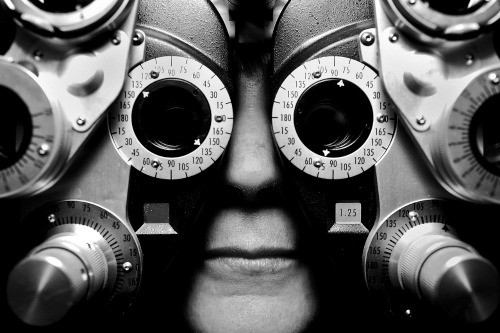Part 6c from my Magic Test of Seven
Learning’s from the book: Vom Unsinn des Sinns oder Vom Sinns des Unsinns from Paul Watzlawick
As the book is in German, and my blog in English, I won’t quote any the phrases this time around. I’ll just try my best shot at telling the stories that Paul shared in his book explaining the reality of reality.
Paul found it fascinating to work with people, who yearned with shining eyes for the day where the world would be freed from irrationality and emotional upheavals when the world could be reduced to 0 and 1. Funnily these exact same people came to therapists because they felt empty inside – and their use of cocaine was higher than average. It seemed as if one needed to re-ingest a certain degree of insanity, if one tried to unravel irrationality on a daily basis.
The book deals a lot with perspective and perception. For instance by calling out the example of a research project by an American group of sociologists. They went to England to study the mating behavior of American soldiers and English women. The encountered an interesting discrepancy. The English women called the American soldiers sexually very direct. Interestingly enough the American soldiers claimed the same thing the other way around. Looking at this more in-depth the research team found out that from the very first-moment eye contact to the actual sexual intercourse there were 30 fairly well-defined steps. Yet those steps were sequenced differently in each culture. For instance, kissing happens pretty early on in the American culture. It is seen as a rather harmless act. Say step 5 out of 30. At the same time in the English culture, it is closer to step 25 of 30. So you can imagine what happens when an American soldier started to kiss an English lady. She was now confronted with a behavior that in this early stage had to be seen as exorbitant. She had two choices. Flee or take it to the next level and start taking off some clothes. In any case, the American soldier, who wasn’t used to this behavior, must have been similarly surprised of what just occurred. Both leaving the entire experience with very different impressions.
Fact is, what reality is, is something different for everybody. The book tells the story of the father and the son and the donkey. They were on a journey on an extremely hot day on a sandy country road. The father was guiding the donkey, which the little boy rode. A group of passengers passed by and the father heard them say: “Look at that! The father is going by foot, and the little lad is sitting on the donkey. What a spoiled brat. What is he going to grow into?”. As the father hears this, he takes the boy off the donkey and instead rides the donkey himself. They continue their journey, and soon another group passes by. They say: “Watch him. He’s riding the donkey, and the poor little boy must go by foot on a hot day like this. Doesn’t he have any mercy?” So now the father pulls up his son, and they ride the donkey together. A little while later a third group approaches them and call out: “Jointly they ride this poor animal, don’t they have a heart?”. At this point the father and son, both get off the donkey and start carrying him. Another group approaches from the opposite direction . . . You get the picture.
Here another great story that illustrates the difficulty of the non-existence of a clear definition of normality:
Several years ago an odd incident happened in a hospital in the Toscana. A highly schizophrenic women had to be taken from Grosseto to Naples for psychiatric treatment. When the drivers of the ambulance arrived at the hospital they were sent to a room where a lady was sitting on the bed, ready to go with her handbag on her lap. The moment they asked her to come along though the patient apparently had another schizophrenic attack. She resisted to come along; she depersonalized and in the end they had to give her a sedative shot. When the ambulance was already on the way to Naples, it became clear that there had been a mix-up. The woman in the ambulance was merely a visitor who came to see a family member.
Now you may say well that was just a pitiable human error. That is certainly true but what Paul found truly interesting about this case is that the error create a reality, in which this woman had absolutely no option to clarify her case. Whatever she would say or do would be interpreted as a further evidence of her mental illness.
Another topic of the book is the search for meaning.
He quotes Orwell when he wrote in one of his essays: “People with empty bellies never despair of the universe, nor even think about the universe, for that matter.” and reminiscence that in his own youth, when he lived in Trieste during the post-war period, suicide rates were extremely low.
Paul claims in his book that boredom is the most diluted form of anxiety and emptiness. That is why we constantly are searching for meaning. Yet when we search for something we have two options. We either search forever and never find it. Or we find it and then it might not deliver the wonderful feeling we had expected. There is a Japanese saying that says; It’s better to travel hopefully than to arrive. Or as Oscar Wilde put it: “There are only two tragedies in life: one is not getting what one wants, and the other is getting it.”
As John-Paul Flintoff in “How to change the world“, Paul Watzlawick also refers to Viktor Frankl.
Viktor Frankl was a famous psychologists and author that survived the Nazi death camps. Watching who did and did not survive, he concluded that the philosopher Friedrich Nietzsche was right when he said: “He who has a why to live for can bear with almost any how. “
Frankl recalls that a friend of his, a fairly well-known composer and librettist, told him in February, 1945, that he had had a dream, in which a voice had told him the exact date of their liberation: March 30th. At that time, the man was still full of hope and believed that the prophecy was true. The promised day approached, but no signs of imminent liberation were seen. On March 29th, he developed a high fever. On the day of the prophecy, March 30th, he became delirious and lost consciousness. Next day he was dead. To Frankl, and to the camp doctor there was no doubt: he had died of typhus. “To those who know how close the connection is between the state of mind of a man – his courage and hope, or lack of them – and the state of immunity of his body will understand that the sudden loss of hope and courage can have a deadly effect. The ultimate cause of my friend’s death was that the expected liberation did not come, and he was severely disappointed. This suddenly lowered his body’s resistance against the latent typhus infection. His faith in the future and his will to live had become paralyzed, and his body fell victim to illness – and thus the voice of his dream was right after all” (p. 97). (source)
Paul writes that many people find it shocking to realize that we do not find reality, but we create reality.
He states that for most people radical constructivism is not acceptable, potentially even scandalous. They think of it as a warmed up form of nihilism. Paul believed that if there would be people who would be capable of truly realizing that we are merely a construct of our reality that these people would distinguish oneself through 3 special capacities:
- They would be truly free, then who knows that one can create their own reality realizes that they can at any time re-create it.
- These people would be deeply ethically responsible, as who has truly understood that he is a construct of reality has no means of hiding behind factual constraints or point fingers at others.
- A person like that would be in the deepest sense of the word conciliatory.
Paul felt he might have met perhaps two people in his life who reached this point. Nonetheless, we may all be there at certain short moments.
He ends his book with a poem from Albert Mombert, where he asks himself, what this poem could do to a person weary of life. I wasn’t able to find a proper English translation. But I found another poem from Mombert which is as melancholically beautiful as the one in the book:
Warm are the breezes,
grass sprouts from sunny meadows.
Hark!
Hark, the nightingale, is pipping…
I will sing:
High aloft in the sombre mountain forest
cold snow is melting and dripping,
a girl clad in grey is leaning
against an oak’s moist trunk:
her tender cheeks are sick,
her grey eyes feverish
through the gloomy giant trees.
“Still he does not come! He keeps me waiting.”
Die!
One dies, beside him the other lives:
that makes the world so deeply beautiful.
My main takeaways:
- We create our own realities, we must be careful with what we create
- Knowing what we are living for, helps keep us alive
- To a certain degree, we can circumstance our own circumstances
- Yet, even when we feel we are constructing our own reality other’s may very well see this differently
My personal thoughts here is that we should not even worry about a single reality. It does not exist. I stick to my idea that every person should have a drawer full of different glasses. And the capability to pull them out of the drawer and put them on to look at any reality and see it from a slightly different angle. That to me is the art of understanding. An art that’s worth honing.


